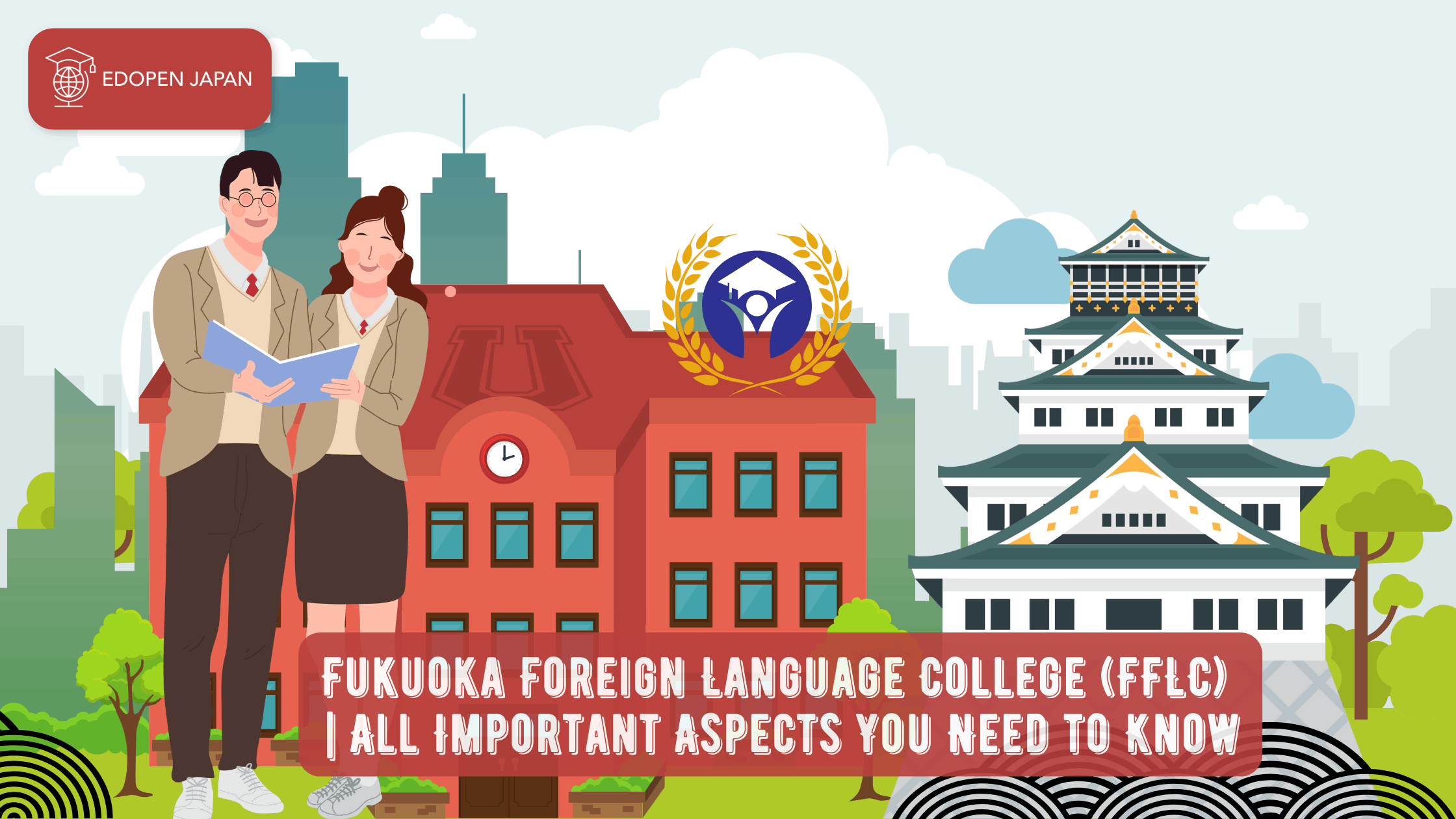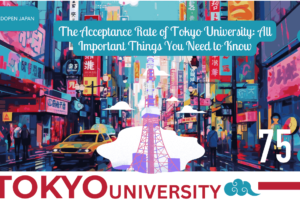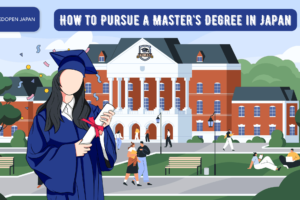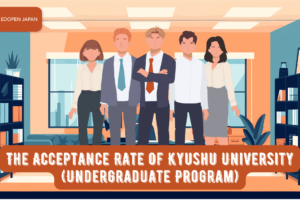Are you dreaming of studying and living in Japan? Or are you searching for the best place to learn Japanese? Look no further than this Japanese language school in Fukuoka. Not only will you receive a top-notch education, but you will also have the opportunity to make new friends and explore the beautiful city. Additionally, you will be immersed in the fascinating Japanese culture of this port city.
Furthermore, Fukuoka, the largest city in Kyushu, Japan, is a bustling metropolis with a population of 1.5 million residents and is renowned for its unique cuisine. As a port city, it is also a center for international trade and commerce. Visitors can explore a range of cultural landmarks, including castles, temples, and beaches, and experience the city’s lively shopping centers.
For comparison, you may find it beneficial to explore the following links of Japanese language and vocational schools located in similarly peaceful cities like Fukuoka. These schools may provide an ideal option for studying in Japan.
Read also:
10 Great Places to Learn Japanese in Yokohama
10 Most Popular Japanese Language Schools in Kyoto
6 Most Popular Japanese Language Schools in Hokkaido
Contents
A Brief Overview of Fukuoka Foreign Language College (FFLC)

Fukuoka Foreign Language College (FFLC) is a specialized vocational school that focuses on teaching foreign and international languages. In addition to its language programs, FFLC is an accredited higher education institution that has been teaching Japanese to global students for over 115 years. The college is situated in the charming city of Fukuoka on Kyushu Island.
Furthermore, Fukuoka Foreign Language College (FFLC) provides a welcoming atmosphere for international students to have a rewarding academic journey in Japan, inspired by the principle “We are a global family.”
- The college is committed to internationalism.
- It serves as a language school for foreigners and an educational institution for Japanese students.
- Thanks to this exchange, it has a multicultural environment with students from more than 30 countries.
With qualified teachers to support and guide our students, the school will help you experience a fulfilling life here in Japan. There are also Japanese students studying English at this school. This international environment is a great opportunity for you to make friends and practice your Japanese in real everyday situations.
In addition to top-notch Japanese language instruction, the school offers Japanese tutors, on-call visa counseling, and part-time or full-time job search assistance for those enrolled in the advanced classes. FFLC’s programs are focused on experiential learning.
Furthermore, FFLC provides an environment where students can shape their own futures through internships, on-the-job training, study abroad, as well as volunteer activities while learning and practicing a foreign language.
College Location
Firstly, let’s discuss Fukuoka, where the school is located. The city of Fukuoka can be found on the island of Kyushu, one of southwestern Japan’s four major islands. With a population of approximately 1.5 million, it has emerged as a major center of commerce, culture, and education on the island. Moreover, Fukuoka offers a comfortable living atmosphere and an ideal learning environment for Westerners who desire to learn about Japan, its unique culture, and language, all without losing themselves in the crowds.
The college is accessible via the JR, a 5-minute walk from the JR Yoshizuka Station West Exit, which is only one stop away from the JR Hakata Station. Alternatively, it is also accessible via the subway, with a 5-minute walk from Maidashi Kyudai Byoin-Mae Station Exit #3, which is only four stops away from Tenjin Station on the Hakozaki Line of the Fukuoka City Subway.
Student Demographics
This top-tier institution boasts a globally diverse student body. Specifically, students hail from Asia, America, and other regions. Let’s examine the breakdown of student nationalities as of May 2022.
| Country | Percentage |
|---|---|
| 1. Asia (Southeast-East) | 55% |
| 2. Europe | 6.86% |
| 3. America (North-South) | 6% |
| 4. Oceania | 0.21% |
| 5. Africa | 0.43% |
| 6. Other | 31.91% |
The College Main Features and Main Service of FFLC

College Main Features
The Fukuoka Foreign Language College has been operating for over a century, since 1902. Its commitment to experience and quality is undeniable. So, what are the main features of the College? Below are some of the key points listed. In general, the College has the following main features:
(1) Multicultural Environment
Japanese and international students from more than 30 countries participate in FFLC. In this diverse setting, developing language proficiency, cultural awareness, and global perspective provide unique advantages that cannot be found elsewhere.
(2) Language and overall professional skills
As a vocational language school, we take pride in providing practical instruction. The courses offer impactful lessons that support your career path, enhance your professional knowledge and skills, and cultivate well-rounded global citizens who will excel in the real world.
(3) Various events to share with the community
The international setting presents students with multiple chances to engage with one another during college events and with the local community via outstanding exchange programs and volunteer activities.
(4) Cozy and fun atmosphere
The welcoming environment at FFLC fosters a sense of community among both students and teachers. As their motto, “We are a Global Family!”, indicates, FFLC is a college where you’ll feel right at home from the start.
College Main Services
What support and services are available to you as a member of this college? Please review the following points for more information.
| Services | Details |
|---|---|
| 1. Free Wi-Fi | Free internet access for all students studying at the school. |
| 2. Student Lounge | The area where students gather to eat, talk, or do their homework. |
| 3. Events | The school organizes various events where you can meet and talk with the Japanese students. |
| 4. Diploma Degree in the Japanese Language | After the 2-year course, you will receive an Associate’s Degree, which this degree will help you find a job and obtain a work visa in Japan. The course will be carried out for two years or 1.700 hours of study. The enrollment for this 2-year program is in April. |
| 5. Full-day job search assistance | From interview preparation for business Japanese classes, this school helps those who are ready to find a full-time job. |
| 6. Career support | Find the perfect job and the opportunity to find higher education in a Japanese University after you graduate. |
| 7. College support | Get help applying to college or vocational school after you graduate. |
| 8. Part-time job assistance | Schools post and update available part-time job opportunities and prepare students for interviews. |
| 9. Cultural activities | Experience Japanese culture with cultural experiences and activities. |
| 10. Friendly lesson for beginner | You can study at this school even if you have never studied Japanese before. |
| 11. Accommodation | Help in finding the right room for you. |
| 12. Multilingual speaking staff | The school can provide assistance in English as well as other languages. |
Additionally, this college boasts a highly diverse environment, vibrant communities, and numerous amenities, providing an optimal studying experience.
The Courses and Expenses at FFLC

The Courses
This school has three departments: the Department of Japanese, the Department of International Culture/Business (for international students living in Japan), and the Department of English (for overseas students).
1. Department of Japanese
In this department, there are 3 types of departments as well. There are the Japanese Language Department, the Department of International Culture, and the Department of International Business. Then, the course offers programs for Overseas students.
Furthermore, this course includes standard lessons, JLPT preparation, and cultural activities throughout the year. The enrollment for the 1.5- the year course is in October and the 2-year course begins in April. There is also a 1-year course that starts from April & October.
Additionally, applicants must have completed at least 12 years of education (high school diploma) in their country or foreign country and have completed 150 hours of basic Japanese language study with a certificate or Japanese Language Proficiency Test (JLPT) 5. Further, a letter of recommendation is also acceptable (in specific countries) in case the applicant is taking Japanese lessons from a private teacher.
2. Department of International Culture
2.1 Pre-University Japanese Course
The Pre-University Japanese Course is designed for students who have already received a certain level of Japanese and are focused on continuing their studies at a tertiary or vocational level. Furthermore, this program develops essay writing and reading abilities as well as focusing on academic Japanese language and listening skills for university-level study. Then, it is offered in a 1-year or 2-year term.
2.2 International Career Course (Overseas & Domestic – International Students)
This course is for those who have already received a level of Japanese equal to or higher than JLPT2. The student particularly wants to work in Japan or for Japanese companies. This course will also prepare you for working in a Japanese company and introduce you to companies and people that are hiring foreign workers throughout Japan.
2.3 International Business Course (Domestic International Students)
This course is for those who have already received a level of Japanese equal to JLPT3 and who want to attain a level of Japanese equal to or higher than JLPT2. Moreover, it will develop your Japanese language ability, and IT skills and improve your overall business communication knowledge. After graduation, students can enroll in the “International Career Course”.
3. Department of English
3.1 English Language
Acquire fundamental English proficiency and experience diverse teaching approaches in international contexts. Upon completing our two-year program, you will earn an associate’s degree. Afterward, you may transfer to your third year of a university in either Japan or abroad, allowing you to achieve a bachelor’s degree.
4. Other Departments and Courses
4.1 International Hotel & Tourism Hospitality Course
This program prepares students for a prosperous career in the domestic and international hotel, hospitality, and tourism management industry. It cultivates managerial skills, improves business acumen, and facilitates networking opportunities. Alongside Japanese language instruction, the program incorporates practical initiatives led by experienced hotel professionals to complement theoretical learning. Upon completion, students will receive their diplomas and have excellent job prospects.
4.2 Short Term Course
For those seeking to practice Japanese or experience Japanese culture during their vacation, the short-term course is ideal. For more information about the specific course details outlined here and other available options, please click the button below.
Enrollment is open year-round with a maximum class size of 10 students. We hope you find the information you need to make an informed decision.
Course Expenses
As for course costs, please note that they vary based on the duration and type of course you select. The following lists provide total expenses (Update May 2022):
1. Regular Japanese Course
| Duration | Amount of Fee |
|---|---|
| 1. 1st Year (1-year plan): | ¥789,500 |
| 2. 1st Year (1-year 6-month and 2-year plans) | ¥844,500 |
| 3. 2nd Year (April Start): | ¥600,000 |
| 4. 2nd Year (October Start): JPY | ¥300,000 |
2. Pre-University Japanese Course
| Duration | Amount of Fee |
|---|---|
| 1. 1st Year (1-year plan) | ¥789,500 |
| 2. 1st Year (2-year plan) | ¥844,500 |
| 3. 2nd Year | ¥600,000 |
3. International Career Course (Overseas & Domestic–International Students)
| Duration | Amount of Fee |
|---|---|
| 1. 1st Year | ¥844,500 |
| 2. 2nd Year | ¥600,000 |
4. International Business Course (Domestic-International Students)
| Duration | Amount of Fee |
|---|---|
| 1. 1st Year | ¥844,500 |
| 2. 2nd Year: JPY | ¥600,000 |
5. International Hotel & Tourism-Hospitality Course
| Duration | Amount of Fee |
|---|---|
| 1. 1st Year | ¥844,500 |
| 2. 2nd Year | ¥600,000 |
6. Short Term Course
For information on the cost of the short-term course, please refer to the first-year cost divided by the number of months the student wishes to take the course for a specific period.
Reviews
According to our research, the Fukuoka Foreign Language College has received a rating of four stars or higher. So, what distinguishes this college? The reviewers have identified the following benefits:
| 1. Teachers and staff are very supportive and also very kind. |
| 2. The school environment is convenient. |
| 3. The classes are interactive and easy to understand. |
What do you think about it? Do you have any experience learning Japanese at this College? Additionally, we would be very happy if you would share your review directly with us. Please leave your feedback in the comment column below!
FAQ About Studying Japanese at Japanese Language School
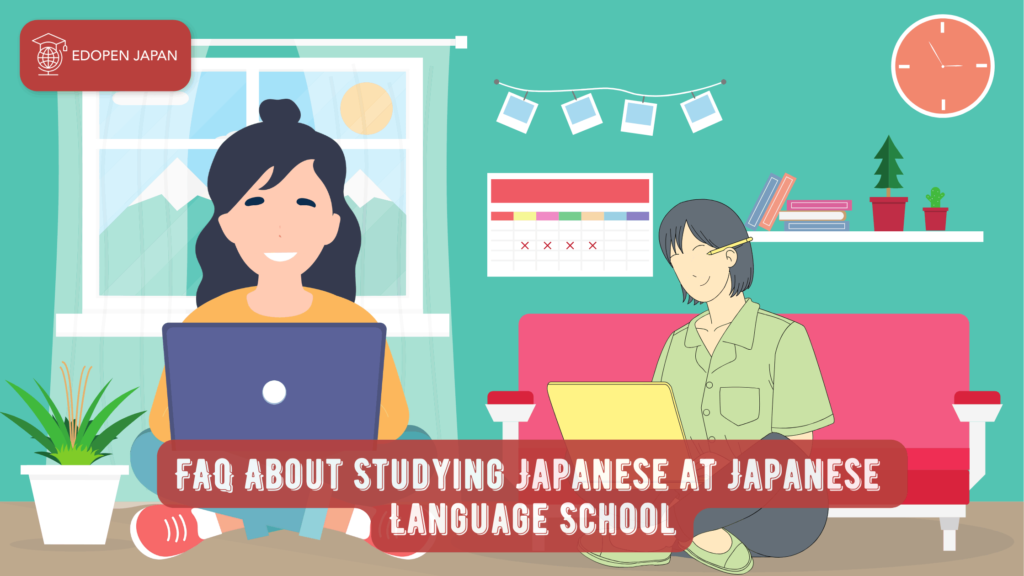
You should check out some of the FAQs we’ve summarized below!
Take a closer look at the FAQs above. Perhaps some answers to your questions are there and can alleviate any confusion. Cheers!
Conclusion
We welcome your feedback on the information provided. Please let us know your thoughts and suggestions for improvement. Please let us know your thoughts and suggestions for improvement. Thank you. Please let us know your thoughts and suggestions for improvement. We hope you find valuable insights about the Fukuoka Foreign Language College.

